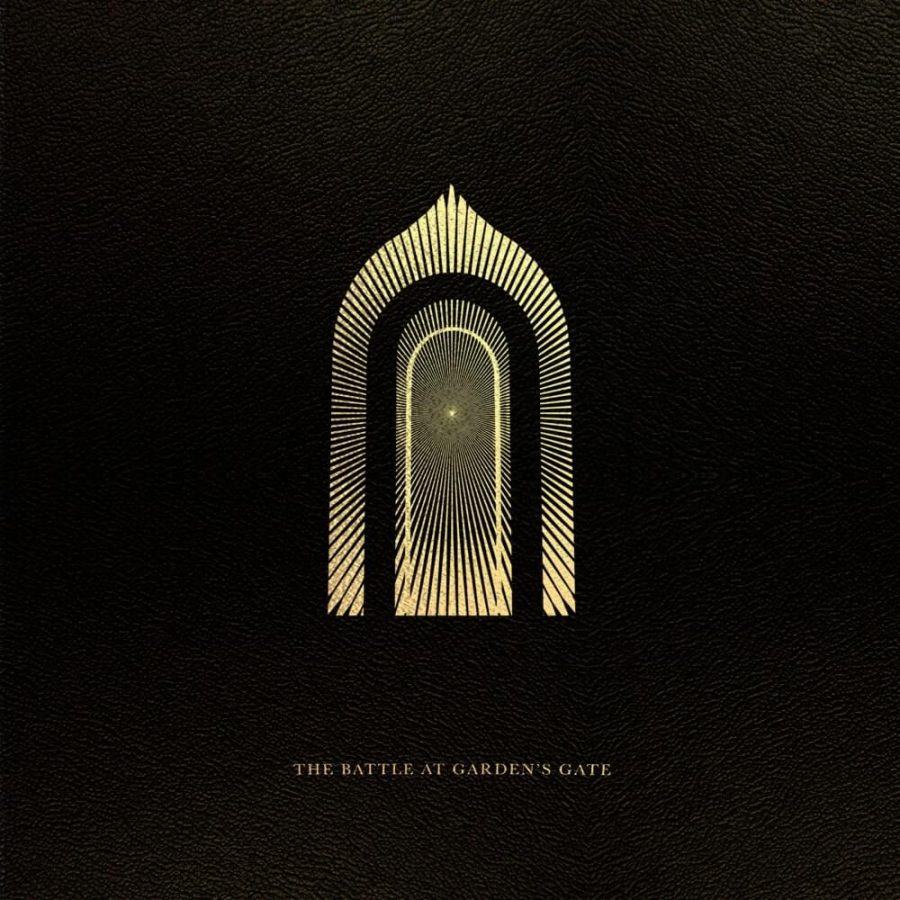Greta Van Fleet’s sophomore effort “The Battle At Garden’s Gate” wears its nostalgic intentions on its sleeve, as well as demonstrating the band’s inability to have ideas of their own.
The Michigan hard-rock band formed in 2012 and has been honing its revivalist rock songwriting ever since a breakout 2017 EP and subsequent debut album “Anthem of the Peaceful Army” in 2018. Greta Van Fleet are a unique rock band, in the sense that uniqueness just can’t quite make its way into the band’s sound. It is a rare case when you see a band as successful as Greta Van Fleet map out the exact vocal range, guitar phrasing, drum breaks, song structure and topics as a band from the past. For Greta Van Fleet, that band is Led Zeppelin. It may be a tired argument at this point, but Greta Van Fleet has almost perfected every detail of a great Led Zeppelin track, and it begs the question: What’s the point?
To be fair, the band’s debut album leaned excruciatingly hard into this gimmick, whereas “The Battle At Garden’s Gate” slightly holds back on the Zeppelin-isms. However, if you have “gotten the Led out” even once in your life, this new album will still warrant an eye roll. This time around, Greta Van Fleet shows some more not-so-subtle influence, this time from the likes of Rush and AC/DC.
Influences aside, Greta Van Fleet finds itself delivering low-grade, low-impact rock music with weak performances and weaker compositions. Nothing is as catchy as “Back In Black,” and nothing is as compositionally exceptional as “Tom Sawyer” or “Stairway To Heaven.”
Tracks like “Light My Love” feature the same whiskey-soaked balladry that your boring uncle would blast on an awkward car ride. The artificial grandiosity of this track is immeasurably thin and exits right out the other ear.
“The Battle at Garden’s Gate” also offers funky rockers like “Caravel,” which just feels like a tacky cover band from your local bar finally saved enough money for a weekend in the studio. The riffs are derivative and the soaring Robert Plant-esque vocals leave the groovier tracks simply playing like wallpaper.
As the record trudges on, the band showcases its embarrassing love for more Zeppelin with the nine-minute closer “The Weight of Dreams.” Josh Kiszka’s lead vocals are excruciating to the ear as he lets out throaty screams over a flavorless instrumental that does not warrant its runtime.
While there are a handful of compositionally ambitious moments on the album, “The Battle At Garden’s Gate” still lacks any sort of catchiness, originality or muscular performance to make its bland tunes stand out.
Greta Van Fleet’s sophomore release will go down as one of the least significant rock releases of the decade. Its utter lack of original ideas as well as forgettable songwriting make “The Battle At Garden’s Gate” a weak rock record on all fronts. It is no historical tribute or celebration, but a mere plastic imitation.





DG • Nov 28, 2021 at 5:15 pm
Proof that it doesn’t take much to be a critic.
Courtney • Nov 16, 2021 at 9:45 am
Lol this is the funniest and best article on a band I’ve ever read. On point. I love how it’s got the readers’ panties in a wad. You’ve said everything I’ve thought about this band. I love Zeppelin, but I took one listen through of GVF and put it down. So flavorless I can’t even recall what the songs sounded like. Yes, millions of people CAN be wrong, and frequently are. Playing an instrument is not a prerequisite for listening to it. Being compared to Zeppelin is not a death knell for creativity-look to Jack White for a good example-however the author is stating the truth here: GVF brings absolutely nothing refreshing to the table.
Stephen Vaillancourt • Sep 24, 2021 at 6:40 pm
As a musician who plays bass and sings in 4 octaves, I can tell you there is not vocalist that can match kiszka in this generation generation in main stream “rock”. However, Johnny Stephens and Brent Smith are equally as good, Kiszka brings a unique flavor to his “throaty ”falsetto. I’d like to know if you actually play an instrument or can even sing 3 notes without sounding pitchy and off key. Their instrumentals are also very well put together with well timed progressions and slow down points. While the comparison to Zeppelin is fair, I think it’s ok. I like Zeppelin. They make original music, and if Zeppelin is one of their influences, then ok. They work towards being as great as one of the most talented bands ever to perform on a big stage. I don’t think you should have your job because I don’t think you know what you’re talking about. Go judge The Voice, or American Idol where people who have no idea what true talent is (the majority of people who vote for that show.) I’ve seen some of the most talented singers get kicked off because people like you have no clue what they’re talking. Notice runner ups trend to be more popular on that show than winners. I think too learn some humility and shut up.
Evan Elder • May 19, 2021 at 3:25 pm
Everyone has their own taste and certainly their own opinions. That said, you must have listened to the album once and been on a deadline to write this review. This album is GVFs best guitar/bass/percussion work yet.The imagery in their lyrics harken back to days of Rush
“The Weight of Dreams” instrumental, 3 1/2 minute break that you deem as “flavorless” is absurd as well.
You do realize that both RUSH and ACDC were also categorized under the Zeppelin umbrella when they began, don’t you?
Would love to hear what your “best rock bands” of today are.
Good news is that your passions are included within Greta Van Fleet- music AND the future
Frank • May 19, 2021 at 1:43 pm
The great thing about music is that it’s purely subjective. I was brought up on a huge range of great music and I think GVF are one of the most musically talented and distinctive bands in the last 10 years…
Keely • May 19, 2021 at 6:11 am
What a terrible article hahaha clearly you do not know good music. Yeah they sound like Led Zeppelin… and?? We all want that music to come back. I love Led Zeppelin and I can still appreciate Greta Van Fleet. You don’t see rock and roll bands any more with that kind of talent. You need to open your mind up a bit. You sound a little stuck up (;
E A Muse • May 18, 2021 at 8:49 pm
Much to my dismay, while searching for some videos of GVF, I came upon Mr. Lang’s link to his critique of this band. I was taken aback not by the “failings” of GVF that Mr. Lang feels so compelled to proclaim, but by Mr. Lang’s anger. I’d rather see his assessment of the band’s accomplishments offset his criticisms, but he fails to mention any. One must ask, could millions of people be so wrong? Perhaps Robert Plant himself is now just too old to offer any musical insights into the success of a new band…
One wonders from what music industry experiences Mr. Lang draws on that has embittered him so much. One wonders what music he has written or what stages he and his band have graced. So, needless to say, I was compelled to respond to Mr. Lang’s critique. It’s going to be difficult for Mr. Lang to offer future reviews of GVF with any seriousness after such an unfortunate diatribe against this popular band. Mr. Lang hasn’t stopped me from listening and appreciating this band. He has, however, stopped me from reading his reviews.
Sonia • May 18, 2021 at 8:14 pm
Oh well, you strike me as the type who prides themselves on cleverness but you really aren’t. This review is just rehashed from 2017 beating the Led Zeppelin cudgel over everyone’s heads selling it as if religion. You couldn’t be more wrong and frankly you’re boring.
David • May 17, 2021 at 1:30 pm
You, my friend are so wrong.